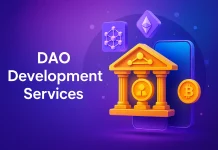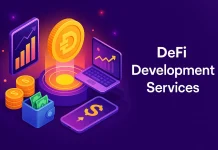Public Blockchain Development Services: A Complete Guide for 2025
In today’s digital economy, public blockchain development services have emerged as the foundation for decentralized applications (dApps), smart contracts, and open-source innovation. Unlike private or consortium blockchains, public blockchains such as Ethereum, Solana, Polkadot, and BNB Chain provide a trustless, permissionless, and transparent ecosystem where anyone can participate. For businesses and startups, investing in professional public blockchain development services is the key to unlocking scalability, interoperability, and long-term growth in Web3.
This guide explores what public blockchain development entails, its advantages, how to choose the right public blockchain development company, and why hiring expert blockchain developers matters in 2025.
Table of Contents
- What Is Public Blockchain Development?
- Why Businesses Choose Public Blockchains
- Core Features of Public Blockchain Development Services
- Key Platforms for Public Blockchain Development (Ethereum, Solana, Polkadot, BNB Chain)
- Smart Contract Development for Public Blockchains
- Decentralized Application (dApp) Development on Public Networks
- Blockchain Interoperability Solutions and Cross-Chain Bridges
- Open-Source Blockchain Development Benefits
- Public vs. Private Blockchain: Which One to Choose?
- Industries Leveraging Public Blockchain Solutions
- Steps to Build on a Public Blockchain
- Hiring the Right Public Blockchain Development Company
- Cost Factors in Public Blockchain Development
- Integrating Blockchain with Enterprise Software
- Security & Compliance in Public Blockchain Development
- Future Trends in Public Blockchain Services (2025–2030)
- FAQs
- Conclusion
 1. What Is Public Blockchain Development?
1. What Is Public Blockchain Development?
Public blockchain development refers to designing, coding, and deploying applications, smart contracts, and protocols on decentralized, open-access networks. These networks are permissionless—anyone can join, validate transactions, and build applications.
- Ethereum: The most widely adopted smart contract platform.
- Solana: High-performance blockchain with low fees.
- Polkadot: Designed for interoperability and cross-chain communication.
- BNB Chain: Optimized for scalability and DeFi ecosystems.
2. Why Businesses Choose Public Blockchains
- Transparency: Every transaction is recorded on an immutable ledger.
- Security: Consensus mechanisms like Proof of Stake (PoS) secure the network.
- Interoperability: Public networks support cross-chain development.
- Innovation: Open-source communities drive faster upgrades.
- Global Reach: Anyone worldwide can interact with your dApp or token.
3. Core Features of Public Blockchain Development Services
- Smart Contract Development: Custom contracts for DeFi, gaming, supply chain, or tokenization.
- dApp Development: User-friendly decentralized applications across industries.
- Blockchain Consulting: Roadmaps and strategy for blockchain adoption.
- Node Deployment & Infrastructure Setup: Running validator or full nodes.
- Blockchain Interoperability Solutions: Bridges and APIs for cross-chain communication.
- Security Audits: Penetration testing, bug fixing, and compliance checks.
- Integration with Existing Systems: ERP, CRM, or inventory management system integrations.
4. Key Platforms for Public Blockchain Development
Ethereum Development Services
Rich ecosystem of dApps, DeFi protocols, and NFT marketplaces. Hire blockchain developers for Ethereum to create custom tokens (ERC-20, ERC-721).
Solana Development Services
Known for high throughput (65,000 TPS). Hire blockchain developers for Solana when speed and low fees matter.
Polkadot Development Services
Built for interoperability. Enables parachains and cross-chain messaging.
BNB Chain Development Services
Supported by Binance ecosystem. Ideal for DeFi, NFT, and Web3 projects targeting mass adoption.
5. Smart Contract Development for Public Blockchains
- Writing and deploying smart contracts on Ethereum, Solana, or Polkadot.
- Token standards (ERC-20, ERC-721, ERC-1155, SPL tokens).
- Audit and verification of smart contracts for vulnerabilities.
- Building DeFi protocols (DEXs, lending platforms, staking pools).
6. Decentralized Application (dApp) Development
- Launch NFT marketplaces.
- Build DeFi platforms for lending, borrowing, and trading.
- Create decentralized identity (DID) systems.
- Enable Web3 social networking platforms.
For example, companies creating social apps can integrate social networking app development with blockchain for user ownership and monetization.
7. Blockchain Interoperability Solutions
- Polkadot parachains enable chain-to-chain interaction.
- Wrapped tokens let assets move between ecosystems.
- APIs connect blockchains to enterprise tools like modern ERP solutions or custom CRM development.
8. Open-Source Blockchain Development
Most public blockchains are open-source, offering faster innovation, transparency, lower costs, and easier integration.
9. Public vs. Private Blockchain
| Factor | Public Blockchain | Private Blockchain |
|---|---|---|
| Access | Open to all | Restricted access |
| Security | Consensus-based | Admin control |
| Cost | Lower entry | Higher setup |
| Use Cases | DeFi, NFTs | Enterprise-only |
10. Industries Leveraging Public Blockchain Solutions
- Finance/DeFi: Lending, staking, asset management.
- Supply Chain: Logistics with supply chain software development.
- Healthcare: Data security with healthcare software development.
- Insurance: Automated claims with smart contracts.
- Entertainment: NFT ticketing, streaming rights.
- Education: Credential verification via education app development.
11. Steps to Build on a Public Blockchain
- Define objectives (DeFi, NFT, supply chain, identity).
- Select the right platform (Ethereum, Solana, Polkadot, BNB Chain).
- Engage a public blockchain development company.
- Design architecture and tokenomics.
- Develop and audit smart contracts.
- Build user-friendly front-end interfaces.
- Launch beta testing on testnet.
- Deploy on mainnet and monitor performance.
12. Hiring the Right Public Blockchain Development Company
Choose partners with proven experience in blockchain application development public networks, multi-chain expertise, security audit capabilities, and enterprise integration knowledge.
13. Cost Factors in Public Blockchain Development
Costs depend on platform, contract complexity, integrations, and audits. Projects can range from $30,000 to $500,000+.
14. Integrating Blockchain with Enterprise Software
Businesses can connect blockchain with:
15. Security & Compliance
- Smart contract audits
- KYC/AML integrations
- GDPR/HIPAA compliance
- 24/7 monitoring
16. Future Trends in Public Blockchain Services
- Layer-2 scaling solutions (zk-Rollups, Optimistic Rollups)
- Cross-chain DeFi ecosystems
- Decentralized identity (DID)
- Green blockchains
- AI + Blockchain integrations
17. FAQs
What are public blockchain development services?
They are services for building dApps, smart contracts, and solutions on open, permissionless blockchains.
Why choose public blockchain over private?
Public blockchains offer transparency, decentralization, global reach, and lower costs.
Which public blockchain is best for developers?
Ethereum is most popular, Solana is fastest, Polkadot for interoperability, and BNB Chain for DeFi adoption.
Who provides public blockchain development services?
Specialized blockchain software development companies with expertise in multiple platforms.
How much does it cost to build on a public blockchain?
From $30K for small dApps to $500K+ for enterprise-grade platforms.
18. Conclusion
Public blockchain development services empower organizations to innovate across finance, healthcare, supply chain, entertainment, and beyond. By partnering with a seasoned public blockchain development company, businesses can deploy secure, scalable, and interoperable solutions that redefine how value is exchanged globally.
The future is decentralized, and the time to act is now—whether launching a DeFi protocol, building an NFT marketplace, or integrating blockchain with ERP and CRM systems.
👉 Ready to explore blockchain for your business? Request a quote today.





[…] Explore additional providers and perspectives at BibiView (e.g., blockchain development services and public blockchain development services). […]
[…] clear KPIs. For additional perspectives and vendor overviews, visit BibiView categories such as public blockchain development services and private blockchain development […]
[…] research and vendor categories, explore BibiView roundups such as blockchain development services, public blockchain development services, and enterprise blockchain development […]
[…] Request a Quote Contact Us Further Reading: Blockchain in Healthcare Solutions (Guide) · Public Blockchain Development Services […]